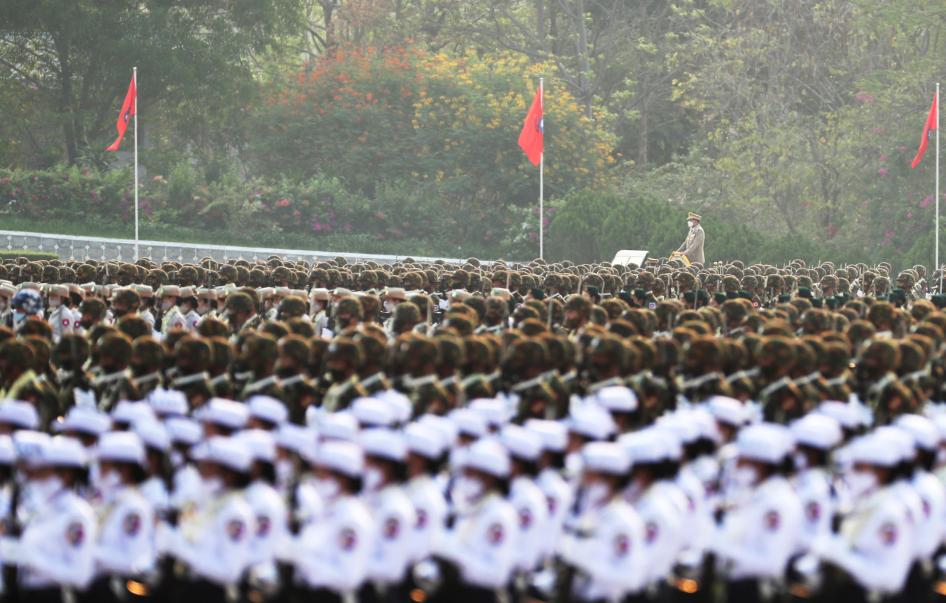(Tokyo) – Myanmar’s junta used Japan-funded passenger ships donated for civilian use for military purposes in September 2022, Human Rights Watch said today.
Letters from Myanmar officials, analyzed by Human Rights Watch, stated that two of three vessels delivered by Japan between 2017 and 2019 were used to transport more than 100 soldiers and material to the town of Buthidaung on the Mayu River in Rakhine State, where the military is fighting the Arakan Army ethnic armed group. The Japanese government should suspend non-humanitarian aid to Myanmar and sanction junta officials implicated in serious human rights violations.
“The Myanmar junta’s misuse of Japanese development aid for military purposes effectively makes Japan a backer of the junta’s military operations,” said Teppei Kasai, Asia program officer at Human Rights Watch. “The Japanese government needs to urgently reassess its obviously failing approach to curtailing the junta’s abuses.”
On September 13, 2022, the Rakhine State government’s transport minister ordered the Rakhine Department of the Inland Water Transport (IWT) to “ready” the Japan-provided “Kisapanadi I” and “Kisapanadi III” vessels for “Sittwe-Buthidaung-Sittwe voyages,” said a letter labeled confidential from the national IWT to the Ministry of Transport and Communications, on September 21. The letter stated that, on September 14, the two ships transported “over a hundred Tatmadaw [Myanmar] troops, as well as their supplies and materials” to Buthidaung.
The transport minister “instructed that the voyages were top secret and that their destination was also classified and no report [to a third party] should be made,” the letter said. Evidently recognizing that this was problematic, IWT noted that it “already had a discussion” with the Rakhine transport minister and “the vessels are no longer used for [military] purposes.”
On September 23, the Rakhine State chief of police and the transport minister, on behalf of Rakhine State’s chief minister, wrote to the national transport and communications minister and specifically confirmed that the two vessels had been used for “military purposes.” In the letter, the Rakhine authorities sought to justify this use of ships, citing provision no. 250 of Myanmar’s 2008 Constitution, which states that “the Region or State Government shall have the responsibility to assist the Union Government in the preservation of the stability of the Union, community peace and tranquility and prevalence of law and order.”
An informal ceasefire between the Myanmar military and the Arakan Army, in place since November 2020, has broken down in recent months. In August, the military reinforced its troops in northern Rakhine State, where fighting has since escalated in intensity and scope, including airstrikes, heavy artillery shelling, and landmine use, with growing civilian casualties.
Since mid-August, the military has isolated and terrorized civilians in Rakhine and southern Chin States to weaken the Arakan Army, using abusive means embodied in the military’s longstanding “Four Cuts” policy. The junta has imposed broad new travel restrictions on humanitarian workers, blocked access to roads and waterways, and arbitrarily arrested aid workers, in violation of international humanitarian law.
On September 15, the junta issued a directive banning United Nations agencies and international nongovernmental organizations from six Rakhine State townships – Maungdaw, Buthidaung, Rathedaung, Mrauk-U, Minbya, and Myebon – and shut down boat lines and public transportation. The fighting has displaced more than 18,000 people since August, joining over 70,000 others who are internally displaced, many of whom are facing shortages of food and medicine exacerbated by the junta’s restrictions.
In response to a Human Rights Watch inquiry on September 20, a Japanese Foreign Ministry official said on October 3 that the “Japanese government, based on the principle of ‘avoiding any use of development cooperation for military purposes’ in the Development Cooperation Charter, will work to secure appropriate use of facilities and equipment provided through ODA [Official Development Assistance] programs.” The official added that Japan “is taking appropriate measures regarding the issue in question,” but refrained from disclosing further details because it was a “diplomatic matter.”
Japan provided the three vessels to Myanmar under the 500 million yen (US$3.5 million) Economic and Social Development Programme, signed on September 12, 2016. The Japanese embassy in Myanmar said the program “aims to improve the ability of the water transport in Myanmar and to contribute to the Economic and Social Development of Myanmar, by donating passenger ships for the coastal transport in Rakhine State.”
Following the February 1, 2021 military coup in Myanmar, the Japanese government stated it would refrain from carrying out new non-humanitarian ODA programs in Myanmar, but did not suspend ongoing projects. As of November 2021, Japan had provided about 1.4 trillion yen ($9.6 billion) in loan assistance, 360 billion yen ($2.5 billion) in grant aid, and 100 billion yen ($690 million) in technical assistance to Myanmar.
The Japanese government should trigger human rights-based conditions enshrined in its Development Cooperation Charter, which states that “Japan will pay adequate attention to the situation in the recipient countries regarding the process of democratization, the rule of law and the protection of basic human rights, with a view to promoting the consolidation of democratization, the rule of law and the respect for basic human rights.”
With respect to humanitarian aid, Japan should maintain such projects but redirect the funds through nongovernmental groups to ensure it is used effectively and directly benefits populations in need, Human Rights Watch said.
“Japan’s halfhearted approach to sanctions has not slowed down the Myanmar junta’s abuses at all,” Kasai said. “Japan should make full use of its reputation as a rights-respecting democracy by using all diplomatic tools available to hold the Myanmar military accountable.”








